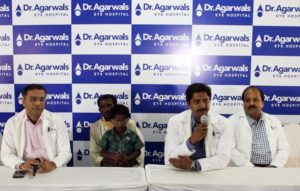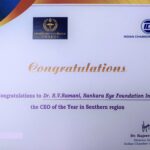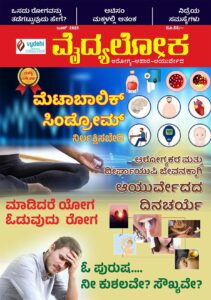

Hailing from Arulnatham a village in Denkanikottai of Tamil Nadu, Shaktivel had a normal childhood. However, two years ago while playing; lime powder accidentally fell into his right eye causing irritation. As access to medical facility was limited, the boy’s family administered him with home remedy. Though the irritation subsided he started developing stickiness and difficulty in closing and opening his eyes. His vision was also blurring. Owing to the socio-economic conditions, the family did not pursue any further treatment.
However, fortunately for Shaktivel, he got referred to Dr. Agarwal’s Eye Hospital, Bangalore for treatment. On arrival, Shaktivel had minimal vision. In fact, he was largely dependent on his left eye. Further, he was not in a position to move his eye ball. On detailed examination by Dr. Raghu, Senior Consultant, Dr. Agarwal’s Eye Hospital and team, it was diagnosed that Shaktivel was suffering from a condition called symblepharon formation wherein the inside lining of the eye lid that covers the eye and the layer that covers the eye ball were stuck together. The stickiness was a reaction of the lime powder. Further, the child was also diagnosed with ectropion, a condition in which the lower eyelid turns or sags outward, away from the eye, exposing the surface of the inner eyelid. Though challenging, Dr. Raghu and team took up the case.
Traditionally the condition is treated by releasing the symblepharon and then grafting the inner layer with amniotic membrane or mucous membrane from the mouth. But, as both the procedures can lead to scaring of the cornea as well as stem cell deficiency, doctor’s opted for conjunctival limbal cell transplant. In conjunctival limbal cell transplant, as the stem cells are taken from the conjunctiva it does not cause scaring. Further as the stem cell is from the eyes it does not lead to stem cell deficiency either. Fortunately for Shaktivel, his father turned out to be a complete match with the same blood group. The doctors harvested the conjunctival limbal cell from Shaktivel’s father and transplanted it to Shaktivel. Today, the child has not only regained his vision, he is ready to lead a normal life.
Elaborating about the case, Dr. Raghu, Senior Consultant, Dr. Agarwal’s Eye Hospital, said, “In this case the patient has been living with this condition for more than 2 years and hence the separation of the tissue was a challenge. We used refined dissection methods to separate the tissue. This helped us to ensure that the inner tissues are not damaged as well as the normal contour of the eye was maintained. Further, controlling the bleeding especially while the tissues are separated also required special care. By administering minimal cautery we managed to arrest the blood flow as well.”
Sharing his joy, Mr. Govindappa, a daily wage worker and father of the Shaktivel as well as the donor said, “We had completely lost hope until we met the doctors at Dr. Agarwal’s Eye Hospital. I am thankful to the ophthalmic experts for restoring my son’s vision.”
While parents always strive to ensure their child’s well being, in Shaktivel’s case, his father has not only taken good care of him; he has turned out to be a saviour in the true sense of the word. Further, the case of Shaktivel also provides a ray of hope for patients suffering from conditions like symblepharon that can lead to blindness.
About Dr. Agarwal’s Eye Hospital:
Dr. Agarwal’s Eye Hospital a comprehensive eye hospital offering a one-stop solution for eye ailments; was started in the year 1957. Now the hospital is in its 61st year of offering quality services in eye care. It has 15 branches in Chennai and a visible footprint in the states of Tamil Nadu, Telangana, Andhra Pradesh, Karnataka, Odisha, Andaman and Rajasthan. A tertiary eye care centre at Mauritius marks its first step towards establishing an international presence extended upto 13 branches covering the Indian Ocean region, African countries and East Asia.
The hospital has received various awards for its inventions and services. In March 2006, Late Dr. J Agarwal, Founder-Chairman was awarded Padma Bhushan by the former President of India, Dr. APJ Abdul Kalam for his dedicated services to the poor and downtrodden. The hospital received visibility in the global arena for its inventions – Micro-Phakonit (Cataract surgery with 0.7 mm size incision) in 1999 and ‘Glued Intraocular Lens Implant’ performed on a 4 year old girl in January 2008 by Prof. Amar Agarwal. In February 2009, the world’s first Anterior Segment Eye Transplant Surgery was performed on a 4 month old child to treat corneal disorder. In November 2013, for the first time in the World, Dr. Agarwal’s Eye Hospital, Chennai transplanted a one year old donor cornea giving a new lease of sight to a 60 year old man through the new technique PDEK (Pre Descemet’s Endothelial Keratoplasty).













